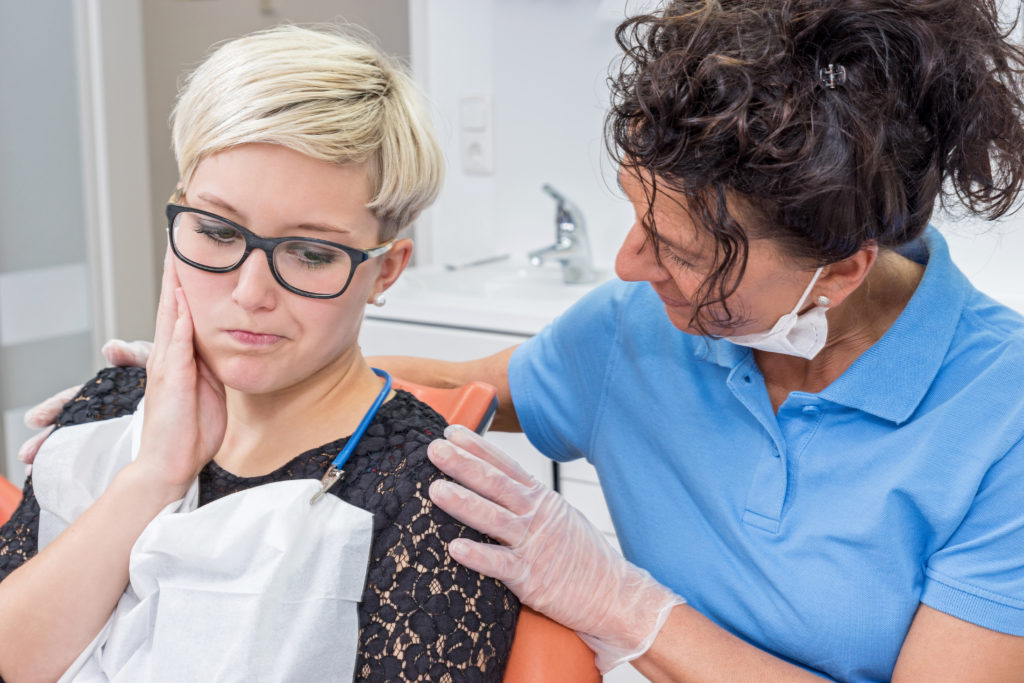The reasons fordental emergencies in Switzerland are varied. Toothache, painful abscess, broken tooth, haemorrhage, dental trauma - what kind of treatment and what kind of pain require a quick consultation? Find out all you need to know to recognize serious dental emergencies.
Toothache
Toothache is one of the most frequent causes of dental emergencies in Lausanne. It is characterized by intense dental pain caused by pulpitis, i.e. inflammation of the dental pulp. In most cases, toothache is caused by a cavity. The pain is initially localized to the affected tooth, but can later spread to a whole area of the face.
Toothache can be caused by a number of risk factors:
- smoking
- high consumption of sweet products
- snacking
- dental malposition
- a change in eating habits
- a bad oral hygiene
In the event of toothache, the first thing to do is take painkillers. Is the pain not easing? Does it become so violent that you can't eat or sleep? Do you notice a dental abscess? You need to see a dentist urgently to relieve the toothache and treat it thoroughly.
Oral infection, an absolute emergency
It's the second most common reason for an emergency consultation with a dentist in Lausanne. Symptoms include intense pain, accompanied by fever and difficulty swallowing or even breathing. In the most worrying cases, the patient presents a swollen face.
Oral infections generally occur after surgery (e.g. tooth extraction). It can also signal a periodontal abscess. All unhealed wounds present a risk of infection, since bacteria can easily penetrate them. If you think you're suffering from an oral infection, go to a dental emergency room without delay. Without prompt attention, bacteria can spread throughout the body, jeopardizing the patient's overall health.
Dental trauma
Like all areas of the body, the oral cavity can be subject to trauma. A fall down the stairs, an accident on a two-wheeler or a physical assault? All these types of impact have the potential to cause serious damage to the gums, jaws and/or teeth:
- dental contusion (shaking of the tooth without fracture)
- partial or total, slight or deep fracture of the crown, root, dental pulp and/or alveolar bone
- partial luxation (displacement of the tooth into its socket)
- complete luxation or dental extrusion (tooth completely out of its socket)
Each of these reasons justifies an emergency dental consultation. Teeth are vulnerable because they are not naturally protected. The most exposed are the incisors and upper canines, because of their frontal position.
Children are the main victims, especially between the ages of 5 and 11. Outdoor sports, outings on rollerblades, bicycles or scooters - there's no shortage of opportunities for injury. They require special treatment because of the presence of baby teeth and the germs of permanent teeth. In such cases, we recommend consulting a pediatric dentist.
After the initial treatment, the patient will probably be asked to make an appointment with a orthodontist in Lausannefor example.
Hemorrhage, a dental emergency
It's not uncommon for dental trauma to cause bleeding in the oral cavity (teeth or mucous membranes of the lips, gums, cheeks or tongue). It can also occur following surgery, such as wisdom tooth extraction, which has not healed properly. This profuse discharge of blood should be taken seriously, and you should be rushed to a dental surgery as a matter of urgency.
Broken tooth, lost tooth: what to do?
A blow to the head can lead to fractured or lost teeth, or even dentures. In this situation, try to stay calm and adopt the following reflexes:
- Clean the wound with clear water or saline solution.
- Observe the teeth and the inside of the mouth.
- Find the piece of broken tooth, if applicable.
- Store as is in milk, saline or saliva for re-implantation within 3 hours.
- Contact a dental emergency service as soon as possible.
Indeed, the functional and/or aesthetic repercussions can be significant. We recommend that you have your teeth checked every 6 months after the impact. This will enable the dentist to detect any late reactions, such as necrosis, in good time.
Dental emergencies in Lausanne
HELVIDENT has a dental clinic in Lausanne, as well as dental centers in Fribourg and Aigle, in the canton of Vaud. Our team of professionals can see you in a dental emergency the same day. We relieve your pain immediately, clean the wound and provide the necessary care. Contact us to get your treatment in French-speaking Switzerland as quickly as possible.

